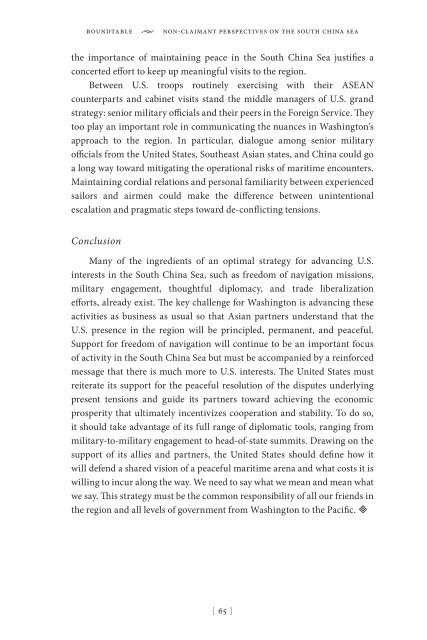Create successful ePaper yourself
Turn your PDF publications into a flip-book with our unique Google optimized e-Paper software.
oundtable • non-claimant perspectives on the south china sea<br />
the importance of maintaining peace in the South China Sea justifies a<br />
concerted effort to keep up meaningful visits to the region.<br />
Between U.S. troops routinely exercising with their ASEAN<br />
counterparts and cabinet visits stand the middle managers of U.S. grand<br />
strategy: senior military officials and their peers in the Foreign Service. They<br />
too play an important role in communicating the nuances in Washington’s<br />
approach to the region. In particular, dialogue among senior military<br />
officials from the United States, Southeast Asian states, and China could go<br />
a long way toward mitigating the operational risks of maritime encounters.<br />
Maintaining cordial relations and personal familiarity between experienced<br />
sailors and airmen could make the difference between unintentional<br />
escalation and pragmatic steps toward de-conflicting tensions.<br />
Conclusion<br />
Many of the ingredients of an optimal strategy for advancing U.S.<br />
interests in the South China Sea, such as freedom of navigation missions,<br />
military engagement, thoughtful diplomacy, and trade liberalization<br />
efforts, already exist. The key challenge for Washington is advancing these<br />
activities as business as usual so that Asian partners understand that the<br />
U.S. presence in the region will be principled, permanent, and peaceful.<br />
Support for freedom of navigation will continue to be an important focus<br />
of activity in the South China Sea but must be accompanied by a reinforced<br />
message that there is much more to U.S. interests. The United States must<br />
reiterate its support for the peaceful resolution of the disputes underlying<br />
present tensions and guide its partners toward achieving the economic<br />
prosperity that ultimately incentivizes cooperation and stability. To do so,<br />
it should take advantage of its full range of diplomatic tools, ranging from<br />
military-to-military engagement to head-of-state summits. Drawing on the<br />
support of its allies and partners, the United States should define how it<br />
will defend a shared vision of a peaceful maritime arena and what costs it is<br />
willing to incur along the way. We need to say what we mean and mean what<br />
we say. This strategy must be the common responsibility of all our friends in<br />
the region and all levels of government from Washington to the Pacific. <br />
[ 65 ]


